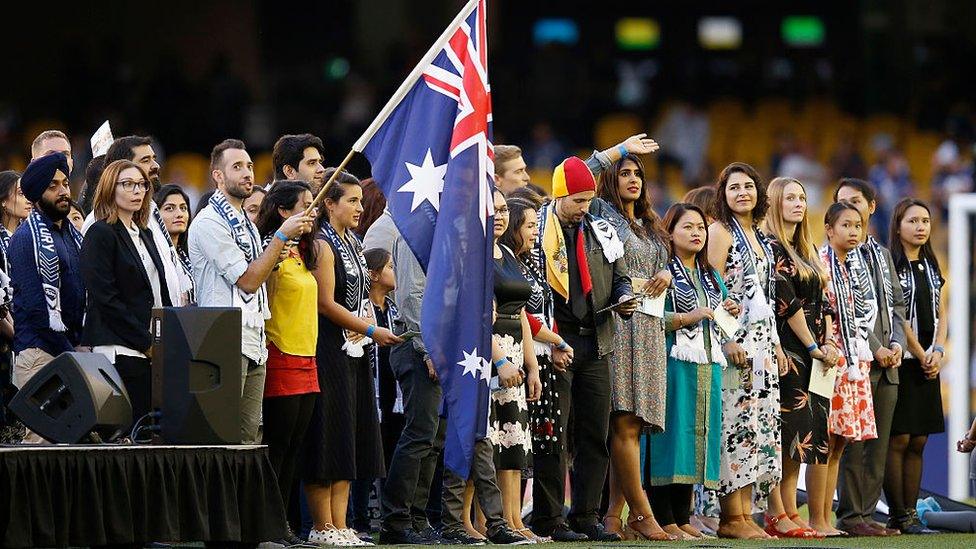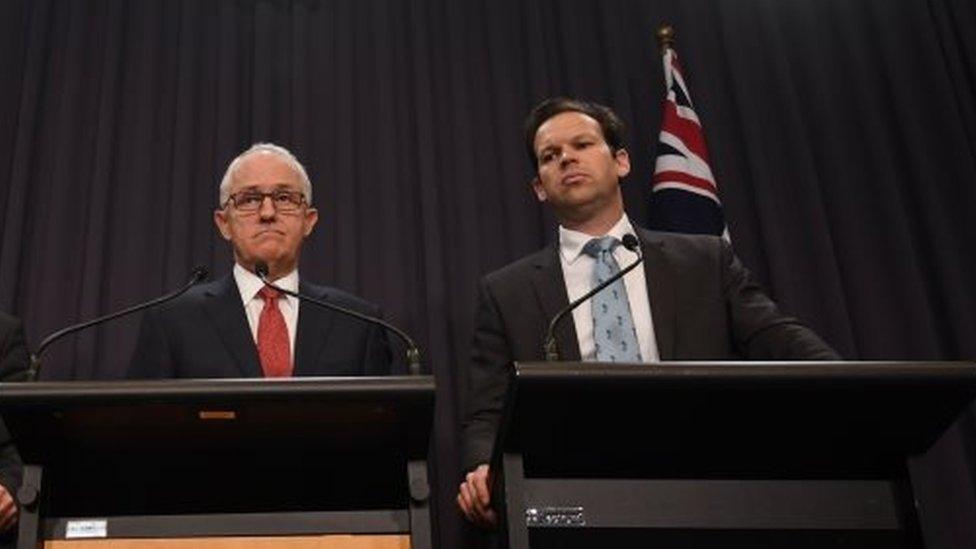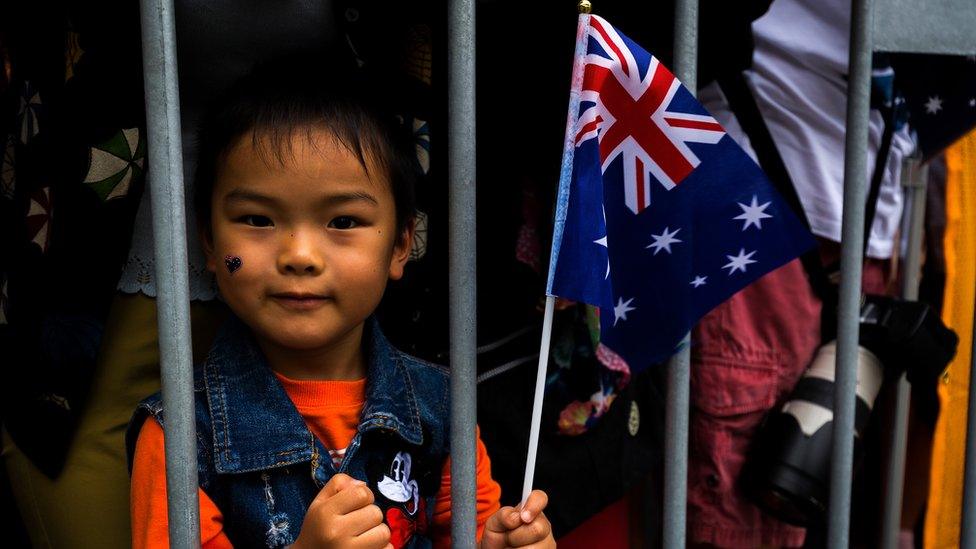How a dual citizenship crisis befell an immigrant nation
- Published

A citizenship ceremony takes place in Melbourne in January
It began with a trickle, and seemed an odd quirk about the immigrant nation that is Australia.
First two senators resigned on learning they held citizenship of New Zealand and Canada. Then a third stood down from his cabinet post on discovering that although he had never even been there, he was a citizen of Italy.
Now, further checks have swept Australia's deputy prime minister up into what has become a full-blown, dual-nationality crisis. If Barnaby Joyce is deemed ineligible to hold his seat after being found to hold New Zealand citizenship, it could force the government from power.
Mr Joyce is the leader of the National Party, the junior member of Liberal Prime Minister Malcolm Turnbull's conservative coalition government, which holds a one-seat majority in Australia's lower house.
If Mr Joyce - Australian-born but to a New Zealand-born father - is ruled ineligible, it would force a by-election which could end the government's grip on power.
Whether that occurs or not, no-one could have predicted the scarcely believable saga which has rocked Canberra for the past month, with Mr Joyce's heavyweight case now the fifth dual-nationality matter to be referred to the High Court.
Serious ramifications
It has all been done under the suddenly menacing shadow of the 116-year-old Section 44 of the nation's constitution, which forbids anyone holding citizenship of another country from running for parliament.
It's an issue which says much about Australia as an immigrant nation, as federal MPs who were born overseas - 25 of them in total - have raced to check which country, or countries, count them as citizens.
Others have been caught up unknowingly, such as Mr Joyce, who says he was unaware he automatically had New Zealand citizenship through his father having been born there.
Allow X content?
This article contains content provided by X. We ask for your permission before anything is loaded, as they may be using cookies and other technologies. You may want to read X’s cookie policy, external and privacy policy, external before accepting. To view this content choose ‘accept and continue’.
While lurching towards comedic farce, the "dual citizenship crisis" has drawn serious scorn for politicians and their attention to detail, after other recent so-called oversights in areas such as official travel expenses and the declaration of assets.
It has also raised the question: how can a populace be sure the people they're electing to represent their interests and advance their country will do just that?
And it has had serious ramifications for the political parties concerned and of course the MPs, with questions over whether they should pay back the vast sums of money earned as parliamentarians.
Succession of disclosures
Initially the situation rocked the Greens, the environment-driven party seen as the biggest parliamentary force outside the dominant duopoly of the conservative Liberal-National government and the Labor opposition.
On 14 July, Greens' co-deputy leader Scott Ludlam, who left New Zealand aged three, suddenly resigned from parliament. The West Australian senator was informed he still held dual citizenship - since he had not formally renounced New Zealand - after some digging by an adversarial Perth barrister, who warned of a High Court challenge to Mr Ludlam's parliamentary qualifications.
This prompted checks by the Greens' other co-deputy leader Larissa Waters, who tearfully announced her resignation on finding she was still a citizen of Canada, where she was born before moving to Australia when still a baby. Similar to Mr Ludlam, she wrongly assumed she had automatically rescinded Canadian citizenship on becoming an Australian.
Larissa Waters: "This was my fault and my fault alone"
A few days later National Party senator Matt Canavan resigned his ministry in Mr Turnbull's cabinet - after a call from his mother.
Maria Canavan, like her son, was born in Australia. But in 2006, due to her Italian parentage, she had registered herself and her three children for Italian citizenship. Mr Canavan, who was 25 at the time, said he had been unaware of this as his mother had not told him. Like Mr Joyce, his eligibility will now be decided by the High Court.
Elsewhere, a Labor MP from Tasmania, Justine Keay, announced happily she had revoked her UK citizenship before last year's election. Doubt arose, however, when it was revealed confirmation of that process was not received from the UK until a week after the election.
However, legal experts believe Ms Keay is safe, as she took all necessary steps to renounce her British citizenship before the poll. Her case has not been referred to the High Court.
Less safe, apparently, is Queensland senator Malcolm Roberts from the far-right One Nation party. He declared he had renounced his UK citizenship before the election, but confirmation was not received until five months after the poll. Also, Senator Roberts had initially merely sent emails to UK citizenship authorities, rather than filling out official renunciation forms as Ms Keay had done.
Senator Roberts' case is now also slated for consideration by the High Court, which will also have to make a ruling on the process for replacing Mr Ludlum and Ms Waters.
Do rules fit with modern Australia?
Overall, 23 MPs born in 14 foreign countries - including former PM Tony Abbott - have now shown proof they are exclusively Australian citizens. Labor senator Sam Dastyari even showed he had spent A$25,000 (£15,000; $20,000) in legal fees to renounce his Iranian citizenship.
The constitution's Section 44 (i), external states that any person who "is under any acknowledgment of allegiance, obedience, or adherence to a foreign power, or is a subject or a citizen or entitled to the rights or privileges of a subject or a citizen of a foreign power... shall be incapable of being chosen or of sitting as a senator or a member of the House of Representatives".
This is interpreted by the High Court as meaning anyone with dual citizenship is not permitted to run for office. Though the clause has so far affected several seemingly innocent victims, it is unlikely to be changed because of the difficulty of altering the Australian constitution.
While formality is not considered a traditional Australian trait, the rash of formally checking credentials says much about the country.
Last year's census showed 26.3% of Australians were born overseas, up from 24.6% five years earlier. And, invoking the case of Senator Canavan and his mother, nearly half of Australians were either born overseas or had one or both parents who were.
Although other countries' constitutions hold stipulations about MPs' citizenship, the problem is not as likely to be seen elsewhere. In the UK, for example, only 13% of people were born in another country. The rates are slightly higher in two other nations drawn into Australia's saga - Canada (22%) and New Zealand (23.3%).
Five takeaways from Australia's census
Section 44 was included in the constitution when Australia gained Federation in 1901, when issues like war, treason, the interests of country and empire may have been the key motivations.
"In 1901 if you weren't a British subject you might have your loyalty questioned," Dr Paul Kildea, senior law lecturer at the University of New South Wales, told the BBC.
While multicultural Australia is vastly different now - even Britain was declared a "foreign power" in a 1999 High Court ruling on Section 44 - Dr Kildea said the principal behind the clause still stood.

Matthew Canavan (right) was a key minister in PM Malcolm Turnbull's cabinet
"If the Australian parliament is presented with a bill which affects another nation, the clause is designed to ensure that MPs will be putting Australia's interests first," he said.
Dr Kildea said the clause could be altered to reflect modern Australia's make-up - either to demand more simply that candidates have Australian citizenship, or have them declare their dual nationality and let the voters decide. A third way was for the High Court to make a ruling, which could then be cited as precedent, that an MP had to have been aware of his or her dual nationality to be ineligible.
Regardless of the motivations behind the clause, Dr Kildea said there were still questions over whether it served its designed purpose.
"Just because an MP is not a citizen of a certain country doesn't mean they won't favour that country, as things like political donations from foreign countries have shown," he said.
- Published27 June 2017
